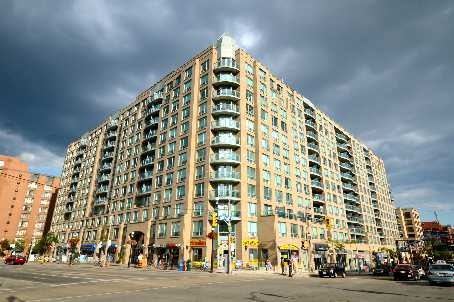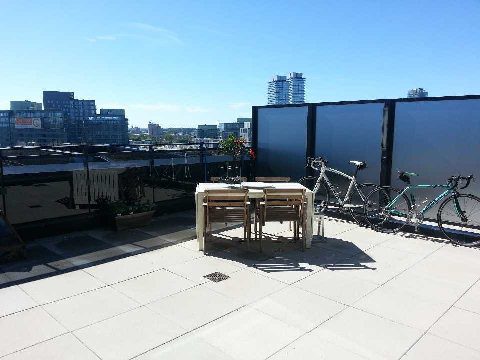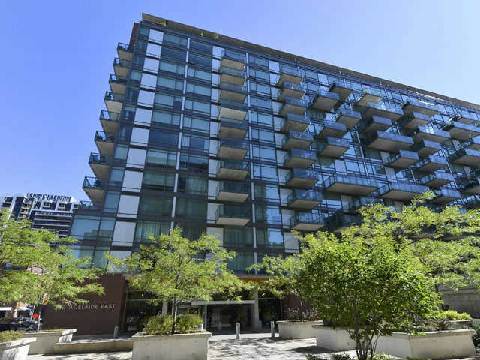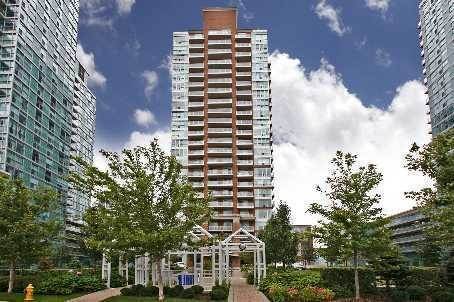Picture yourself being a 23-year-old, just out of university, working your first job in downtown Toronto.
Now consider that after living with mom and dad in Ajax for a year, you would do absolutely anything to get out of their house, stop commuting 90 minutes each way, every day, and get into a property in the downtown core.
You have many options at your disposal, but from my perspective, you have four choices as to what you do with your savings, how you much you pay each month, and the style in which you are going to live…

When I first started in this business, I used to work on a lot of leases for young people moving into the city.
In fact, I had one client who went to Queen’s University who I helped find a property to lease, and before I knew it, I had leased places to eight of their friends.
One group of the Queen’s crew consisted of three young guys, who were scraping together every penny to be able to afford the move. They wanted to look at a 2-bedroom, 2-bathroom condo, which I found to be a bit strange, given there were THREE of them.
Upon visiting the unit, one of the guys – the smallest one, went into this massive hall closet, and laid down on the floor! He stretched his arms out to both sides, got up, and announced, “Yeah, I could fit in here.”
Their idea was for the three of them to rent this condo, priced at $2,300, and apportion it as follows: the richest of the three would pay $1,200 for the large master bedroom with the ensuite bathroom, and he would take the parking space. The second guy would move into the smaller, 2nd bedroom, and pay $700, and the last guy would pay $400 to put his single-mattress in that giant hall closet!
In the end, they didn’t take the place, nor would a landlord have been in his right mind to allow three people to rent a 2-bedroom condo.
But it shows you what great lengths some young people are willing to go to in order to live on the cheap side. A client of mine who was renting out his property at The Icon went to inspect the property one day and found THREE mattresses in the 1-bedroom condo, which he found odd, since he only rented to ONE person.
The way I see it, young people have four major options at their disposal, which I’ll lay out below.
In the war between real estate bulls and bears, and with all the debt-conscious, and debt-loving folks out there, I’m sure that many of you will LOVE to comment on the pros and cons of the following four options:
1) Rent A 2-Bed, 2-Bath With A Friend
This option represents two drawbacks:
1) Renting rather than owning
2) Sharing accommodations
Or, if you’re a real estate bear, and financially conservative, you think that this is the best option on the board!
Either way, it’s often the first option for young downtown-seekers, and it allows them to get out of mom and dad’s house, and it doesn’t break the bank.
Let’s look at a listing near me:
109 Front Street

Right now, there’s a 2-bed, 2-bath, about 855 square feet, for $2,350/month.
The unit has a parking space, and both bathrooms are 4-piece, meaning each “roomie” gets his or her own bathroom, although the master bedroom will have an ensuite, meaning that the second bedroom defaults as the “guest” bathroom as well.
With this unit, ALL utilities are included, so there’s no heat, hydro, water, electric, etc. to pay for.
At $1,175 per month, it’s insanely cheap to live downtown.
The location is A+, although the unit itself is dated, and a bit dingy. But what do you want for $1,175?
And for those of you that thought CityPlace would offer cheaper options, you’re wrong. The cheapest 2-bed, 2-bath available right now is $2,500!
2) Rent A 1-Bed, 1-Bath
The cheapest condo for lease in the downtown core, on MLS right now, is $1,250 per month.
It’s 390 square feet…
Assuming you want to consider something a bit more liveable, let’s look at this one:
51 Trolley Crescent

What?
Oh that?
That’s just a P – I – M – P terrace that measures 445 square feet, outside this 502 square foot condo!
Listed at $1,525, it’s an awesome unit, in a somewhat up-and-coming location.
The utilities are not included with this unit, so add on about $120 per month.
With this option, your all-in cost is $1,645 per month.
Does that make sense? Shouldn’t there be a premium to living without a roommate, and isn’t it worth it?
3) Buy A 1-Bed, 1-Bath
Now we’re completely changing gears, and you have to consider not just the monthly carrying cost, but also the down payment.
No doubt about it – the lifestyle is better owning than renting, as there’s something to be said for the freedom that comes without living with, under, or for another person, and there’s a value to the “pride of ownership” that allows you to feather the nest, and keep your home in good repair.
The lifestyle of living alone is also clearly better than living with a roommate, especially if your roommate turns out to be something like this:

But alas, you have to have this darned down payment!
So consider every tank of gas you pumped, every shelf you stocked, every shish-kabob you made while being yelled at by angry Italian men who may have been in the Mafia, every table you served, and every line of shots you poured on the bar (those pretty much sum up the jobs I had from age 14 – 19), and now think about putting all that hard-earned money into your primary residence.
Let’s take a look at this listing:
333 Adelaide Street

The condo is about 525 square feet, and has a bedroom separate from the living space, albeit with no window.
The unit is open concept, with enough space for a living room couch and TV, as well as a dining room.
It’s not a massive space, but it’s only $305,000.
Let’s assume that you’re putting down 10%, or $30,500. Remember that this isn’t a sunk cost, so don’t say that “renting costs less because you don’t put any money down.” You’re not exactly losing this money…
The sunk cost you DO pay is Land Transfer Tax, but if you’re a first-time buyer, your rebate for the municipal LTT would cover the whole portion payable in this case, and your rebate for the provincial LTT would cover all but $1,050.
Your monthly mortgage payment at current rates would end up being about $1,301.92, and that includes the CMHC premium of $18.30 per month, since you don’t have the necessary 20% down payment to avoid the fees.
The maintenance fees on this unit are $266.74 per month, plus about $100 for heat and hydro.
You’re also looking at about $162 per month for property taxes.
All told, to buy this property, with $30,500 as a down payment, $1,050 in land transfer tax, and likely $1,800 in legal fees to close the purchase, it’s going to cost you $1,830.66 per month to live here.
That’s a good chunk more than both the rental options, but of course, I have to mention something called mortgage principal.
Of that $1,301.92 mortgage payment each month, only roughly HALF is interest. The other half is principal, which doesn’t come back to you in the form of cash in your pocket, but does so as equity.
So if you want to take out $640/month from the $1,830.66 cost of living, now we’re down to $1,190.66, and that’s about the same price as it cost to live in the 2-bedroom, 2-bathroom with the roommate.
4) Buy A 2-Bed, 2-Bath And Rent To A Friend
Here’s a crazy story, that sounds unbelievable, but I swear is true.
Back in 2007, a friend of mine bought a 2-bedroom, 2-bathroom condo, and decided to rent the second bedroom out. He was looking for just anybody, and after a couple of pretty random dudes sleeping on a blow-up mattress, basically paying by the week, he found a long-term tenant who was new to Canada, and lived there for two years, paying an insane $1,000/month for that tiny room.
In 2009, that young renter called me and said that he wanted to buy a condo. Guess what he wanted? Yep – a 2-bed, 2-bath, so he could rent out the second room. I sold him a place up the street, and he found a 20-year-old Ryerson student to rent the second room from him for $850/month. I guess he soon realized that the $1,000/month he was paying was nuts, but live and learn…
As you might guess from this story, in 2013, after living in that small second bedroom for about 3 1/2 years, the Ryerson student, who was now in his second year of a “big boy job,” came to me looking to buy a condo, also a 2-bed, 2-bath. He ended up renting to his younger brother..
This isn’t a bad way to get into real estate, and it can certainly help your cost of living.
Let’s look at this property:
50 Lynn Williams

The deal is fantastic – a 2-bed, 2-bath (both baths are 4-piece) condo measuring about 840 square feet, with parking and locker, for $400,000.
Assuming you make the same 10% down payment that we used in the above example, here are our working numbers:
Down payment: $40,000
LTT: $2,475
Legal Fees: $1,800
Monthly Mortgage Payment: $1,707.43
Maintenance Fee: $411.73
Hydro: $50
Taxes: $208.87
Rent for 2nd Bedroom: $1,100
So your monthly cost is $2,378.03, but you’re getting $1,100 for the second bedroom, so it only costs you $1,278.03.
But if we consider that about half of the $1,707.43 monthly mortgage payment is mortgage principal, and subtract $835 in principal from the $1,278.03 cost after the roommate pays his or her rent, then we’re only left with a paltry $443.03 per month.
That’s it.
$443.03 per month, to live in a 2-bed, 2-bath condo in Liberty Village with a roommate, after you’ve made a $40,000 down payment on the condo.
–
Well, I certainly didn’t set out to make this a column on “why you should rent instead of owning,” but the numbers would lead us to that conclusion.
I know I dumbed this example down a little, but we’re not looking to build an Excel model here; just get the feel for the options out there for young, first-time downtowners.
At the risk of sounding too “pro-buying,” let me give you two advantages to renting:
1) Short committment. It’s only 12-months, and you can leave afterwards, and rent elswhere, or buy once you’ve learned the city.
2) Cost of selling. I won’t pretend like it’s not expensive to transact in real estate in Toronto, and there’s a cost associated with disposing of the asset. However, considering prices have increased every year for 17 years, the appreciation of the condo should more than outweigh the cost of selling.
And now, I open the floor.
Bears, try not to get run over by the bulls…































Ryan
at 8:17 am
Great summary, Dave. As a first-time homebuyer, these are all options that I considered, and ended up going the small one-bedroom, one-bath route (It’s Precon so I know you’ll hate me for breaking that rule – but given the walk-in closet, room for a 30 x 60 dining table, and the discounts that the builder was willing to throw in – I decided to take it). I figure that the unit will fit my 4-year plan, and I’ll end up renting it out once I outgrow it…
Since we’re on this topic, I’d like to know if you could walk us first-time buyers through what happens after we take occupancy of a new condo? I understand that occupancy is based on readiness – but how do things like the placement of parking spots work? Can you provide a mock version of a realistic closing statement? (Every article just lists the basics like LTT and lawyer fees – but I know that we have levies, connection charges, Tarion, etc) and a look into what some of the most common PDI problems you see:
moonbeam!
at 9:31 am
I’ve done 2 PDI’s, one on a new condo, one on a new house… If possible, take along a contractor friend or someone knowledgeable about construction, go thru the unit with a notebook & fine-toothed comb, write down everything from a minor scratch to major missing items, don’t assume anything from the buider’s rep. And don’t depend on Tarion… getting concerns warranted and addressed can take months and years!
Chroscklh
at 11:00 am
This dining room table exceed size of my whole house. congrats friend, i hope you have the many friend to enjoy gargantuan table
Appraiser
at 9:08 am
Careful David. You left out one crucial element in your analysis, the opportunity cost of the down payment.
Surely, the bears are busy wearing out the batteries in their calculators to prove that the down payment would be far better served by investing it with someone like Garth Turner. After all, the unregulated “financial advisor” (a term which at present anyone can use) pretty much guarantees a double-digit annual return on your money, if only you would entrust it to him (for a small fee, of course).
Libertarian
at 11:26 am
Unregulated “financial advisor”?
Are you implying that real estate agents are regulated? One of the main themes of David’s blog is that he wishes there were more rules, any rules, in his industry.
The financial services industry has way more rules than real estate industry.
Appraiser
at 12:21 pm
@ Libertarian. Real estate in Ontario is regulated by provincial statute: The Real Estate and Business Brokers Act. It is further regulated and administered by RECO (Real Estate Council of Ontariio). It is further regulated by local real estate board rules and regulations. You have to have a licence to trade in real estate in Ontario, it is a criminal offence to do otherwise.
Anybody can call themselves a financial advisor. There are no rules, no regulations and no licencing requirements.
Libertarian
at 1:33 pm
Securities are also regulated in this province by the Ontario Securities Act, oversight done by the Ontario Securities Commission. The OSC also oversees regulatory organizations such as IIROC and MFDA.
I agree with you that titles are an issue in the securities industry (financial advisor vs. financial planner vs. stockbroker, etc.), but if you think that any Joe Blow can sell you a stock or bond or mutual fund, you are mistaken. There are licensing requirements in the financial services industry.
Appraiser
at 7:42 am
@ Libertarian:
As I said. Anybody can call themselves a financial advisor. Anybody.
What part of “anybody” don’t you get?
jeff316
at 9:29 am
Admittedly out of geographic scope, but there is also renting a one bedroom for 1100$ or a two bedroom for 1500$ north of St Clair.
Huuk
at 9:31 am
Buying a condo in this city without knowing where you want to live EXACTLY is a very poor financial decision. As you clearly stated, it very expensive to transact in RE, so you better be sure your are not going to change your mind in the short term.
I rented for 18 months until I was 100% sure where my target location for 5+ years was going to be. I would suggest that to anyone that is looking to buy for the first time in TO and is not a pro with all the ‘hoods in the city.
Kyle
at 9:45 am
If one is only looking at the financial aspects, the time horizon is going to be one of the most important considerations. Owning has higher upfront sunk costs, but much lower ongoing sunk costs than renting, so eventually the costs from renting overtake the costs of buying, even though they started off lower. Generally the longer your time horizon the more owning makes financial sense.
Also the same people who talk about the risk of buying at these levels, don’t seem to understand that renting also carries very high risks. So while there may be an uncertainty about how much future equity you might have if you buy. There is 100% certainty that you will lose 100% of every penny you pay into rent. Also over time in a rapidly expanding city, real estate prices SHOULD AND WILL rise faster than average incomes, so the type of housing that is within reach to first time buyers today, will not be within reach to them tomorrow. One only needs to look at New York’s Lower East Side, to see what the passage of time will do to affordability in an expanding city. What used to be tenements are now out of reach to all but the wealthiest and no amount of hoping, wishing and praying for a crash is ever going to bring those prices back to the tenement days.
Geoff
at 11:31 am
Clearly the biggest risk to owning is that the kid is 23.
I rented from 19 – 26, and just being able to rent offered a lot of options. I could have moved to BC (nearly did), I changed jobs without worry, and it allowed a lot of freedom. Maybe he goes back to school. Maybe he meets a girl and knocks her up. Maybe he decides to take that job in Singapore. You’re only in your 20s once. Now that I’m almost 40 and my kid is 7, I have much less freedom even though I have far more money.
I own my home now (and have since buying my first condo at 27) but there’s a lot that can happen at 23. Renting is the only way to go. And if possible, rent without roommates. And living by yourself reminds me of Ferris “if you have the means I highly recommend it. It’s so choice.”
Personally renting is clearly the recommended choice I would make. It’s very hard to predict the future, but the future at 23 (when I was single) was a whole lot less predictable than it is now (at 40, married with a 7 year old).
Kyle
at 9:25 am
At the outset of my argument, i did add the qualifier, “If one is only looking at the financial aspects”, because as you point out there are many non-financial aspects. Some 23 year olds will value the feeling of not being tied down, while others will value the feeling of being settled, some will value the option to be able to live in a new neighbourhood each year, while others will value the pride of ownership and sense of community. Each individual is going to have to put their own price on these non-financial aspects and weigh it against the financial aspects.
Though you and i seem seem to have had very similar paths in life, I had a very different perspective when i was 23. By graduation i had my five year plan in place. I knew i wanted to stay in Toronto not far from the core (where jobs in my Industry are plentiful) and i knew i wanted a house. I spent the next five years working, saving, investing and living like a pauper to pay off my student loan and accumulate a large down payment. Similar to you, I bought my first house at 28, and now have a family and have moved up. Looking back from a purely financial stand point, i can honestly say i am far better off having bought instead of rented.
Chroscklh
at 11:20 am
There is other choice – but I suggest is not the easy one…buy the 3-4 bedroom house, rent room to friend, student, well-behave derelict etc…Is not easy to have downpayment or qualify as young person (maybe get the co-signer?) and if u lose tenant, must be able to cover mortgage for while -BUT, and this only anecdote, but friend buy house in high-park after graduate, 22-23 year old, for $375k, rent room to friends who like cast of “Old School” for 10 yr, get married, shoot/kick-out friends, sell house $900k, buy $1.2mm house with mortgage under 500$k. He a laughing all times – I hit in face and he still laugh. But maybe glory days slowing, even for house. Maybe is no easy make so much money.
Greg
at 11:34 am
Something I failed to consider as a first time buyer…or rather, something I wish I had been offered as guidance from someone with wisdom:
Generally speaking: Consider that a young professional is likely to see steady wage increases annually for 10 years as they progress through their professional prime years. Take a fixed 5YR mortgage for security, and the pain of monthly payments will slowly ease, while your wage increases.
If I had of realized this at the time, I would have, within reason, pushed my budget more on my first property and moved into the neighbourhood that I really wanted. The property values in that ‘hood are now $600K higher than what I would have bought at the time (8 yrs ago), and my mortgage would be pretty well paid off by now.(I’d have an awesome return on investment too)
Instead, I chose another ‘hood….only to move into my first choice after 6 years…almost starting over with a huge mortgage. *Sigh…Now that the kids are finally out of daycare, I can pay down my mortgage and catch up. 🙂
Chroscklh
at 11:48 am
This is the very good point and has served people well. It is obv the more risk, and everyone signing for the mortgage tends to find some comfort in buying below what approve for most people who “stretch” get better result. Of course, not the anecdote of guy who lose great job, get lower-paying job, fire-sale house & lose shirt. But for most – makes sense. I think like stock investor – if u know u need buy bigger house, you are “short” housing, must buy in future at unknown price. house price crash, you laughing. House price go up – cover short more money than today. This why many baby buy house in my willage. But baby terrible neighbor.
Kyle
at 5:03 pm
I couldn’t agree more Greg. If there is one real estate regret i have it was being, as Chrosklh puts it “short” housing. After getting married my wife and i bought a 3 bedroom semi, thinking “it’s just the two of us we don’t need more house then this”. At the time we passed up many much larger detached homes, that wouldn’t have been much more of a stretch for us to carry. 5 years later with 2 kids and a live-in Nanny we had to “cover our short”, and pay the transaction costs to do it. While we still did quite well on the semi, in hindsight had we bought the house that met our future needs instead of the house that only met our current needs, we would have been much further ahead and likely would not have had to move.
natrx
at 12:52 pm
How about the option of renting an older, brick and mortar apartment. Near a subway. You don’t have to put up with a landlord that will try to jack your rent up. Plenty of 1 bedroom, large units for about 1200-1300.
Also, you’re not restricted to having only 1 person living there, as it’s much easier to ‘rent out’ the living room, have a roommate, etc. Property manager doesn’t care usually. You might call it living like a cockroach, but they, that’s how alot of immigrants got started. When I rented at Yonge and Eglinton, one of the nicer ones, that was somewhat common.
Or how about renting in a rooming house? Alot of those around, offering bedrooms for $500-$700.
109 Fronter
at 3:30 pm
FYI, 109 Front has depressed 2 bedroom rents because their board does not allow units to be rented to any two people who are not in a conjugal relationship. I seriously would love to see the wording on that bylaw.
Potato
at 9:42 pm
Opportunity cost, maintenance, insurance [granted for a condo it’s not much more than tenant’s insurance], transaction costs. Also, those maintenance fees are only $0.50 per square foot and someone once told me that that was suspiciously low.
/bear
steve
at 10:52 pm
I sure hope you guys who think RE always goes up are right.
George
at 12:55 am
Time is the big variable at that age. I don’t know too many 20-25 year olds who are planning on staying in the same job, location, financial, and relationship position for a long enough period of time to justify the transaction costs of purchasing and selling real estate.
Lola
at 4:19 pm
IF you have to move, and IF run up of property value doesn’t offset transaction cost of selling (even with a probability on each of 50%…. .5X.5 = .25 so only 25% likely both will happen, then worse case is you rent it out. Always buy a condo that allows for rentals.
Paully
at 6:52 am
Instead of a condo, a 23 year old should get a dog, or a puppy to be exact. Walking the puppy will keep him fit and healthy. And puppies are chick magnets, so he can meet someone and just move into her place! If I knew then what I knew now…
Libertarian
at 11:22 am
It’s always fun reading the debates between bears and bulls, but I tend to think of it in a different way.
If a person is financially disciplined, it makes no difference whether he/she rents or owns. In the long term, she will be in great shape. Renting vs. owning comes down to personal preference.
A financially undisciplined renter will have a harder life in the future based on his inefficient use of resources over the years. (Unless, of course, he makes a million dollars per year in income, but most of us don’t, so you get my point).
A financially undisciplined owner is where it gets tricky. Yes, the “forced savings” of owning will likely keep him in line, but that is not guaranteed.
I’m interested in seeing what happens when current conditions change. There are many things that could change, but the biggest factor is likely interest rates. If rates do go up and go up quickly, it’s possible that undisciplined owners could be screwed, which leads to them selling. In this case, the bears would be right. But if interest rates don’t change much, the bulls will be right. Like all things in life, I’m guessing we’ll land somewhere in the middle, so it will be up to each individual owner to manage his/her finances over the long term.
Should be interesting over the next few years!
Appraiser
at 12:27 pm
“I don’t see a housing bubble, neither does the governor of the Bank of Canada or the CMHC or the OECD.”
Joe Oliver, Minister of Finance.
LauraL
at 9:53 am
Are you suggesting we commit fraud?
If I buy a 2-bedroom, 2-bathroom condo and rent out a room, the money I receive from rent is income, and it will be taxed as such. Your calculation assumes I did not declare it and I did not pay income taxes on it. So I guess you are suggesting we commit fraud?
Lola
at 4:17 pm
Actually you would expense much of that revenue- portion of mortgage interest, maintenance fee, property tax, repair costs- so the portion left to pay tax on is minimal (especially if in a lower tax bracket). I’ve run the numbers and it definitely is worth it, and all above board.
Kyle
at 10:21 am
What has this world come to? Garth is now saying no real estate crash on the horizon (of course he’s also lying and saying he never said one was coming – but that’s another story). And now Carrick is basically admitting that those who followed to his advice to rent instead of buy, are now screwed:
http://www.theglobeandmail.com/globe-investor/personal-finance/mortgages/housing-market-beats-up-on-first-time-buyers/article20951842/